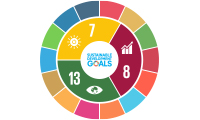Plastics
We produce chemicals that are the raw materials for plastics and plan to produce more as global demand increases. Plastics provide important benefits, helping to improve living standards, hygiene and nutrition around the world. Plastics are often associated with disposable and throwaway packaging but many products have different and long-term uses such as medical equipment, computers, smart phones, window frames, sports equipment and roofing.
Most plastics use fewer resources and have a lower carbon footprint than the glass, paper and metal they have replaced. For instance, efficient plastic insulation and lightweight plastic parts in cars and planes save energy, which helps to avoid CO2 emissions. Plastics are also integral in the construction of renewable energy infrastructure, such as wind turbines and solar panels.
We share public concern about plastic waste and want to play an active role in finding lasting solutions to this challenge. The problem is not with plastics themselves, but what happens after people use them. Sometimes waste management infrastructure and traditional recycling do not exist, or plastic waste is not managed appropriately. And as a result, plastic waste can end up as litter.
We are a founding member of the new Alliance to End Plastic Waste. This alliance of global companies includes chemicals and plastic manufacturers, consumer goods companies and waste management companies, along with the World Business Council For Sustainable Development. The alliance has committed more than $1 billion with the goal of investing $1.5 billion over five years to help end plastic waste in the environment. It focuses on four areas: waste infrastructure, innovation, education and clean-up.
What else is Shell doing?
We are exploring process technologies to make better use of plastics after consumers have finished using them. For example, by turning them into useful liquids that could be used as a source of energy, as chemicals or as new products, which would help develop a circular economy of plastics.
The Shell Pennsylvania Petrochemicals Complex (Shell Chemical Appalachia LLC) in the USA is collaborating with local groups to encourage more plastics collection, recycling and education. Shell Retail is helping its service stations reduce, reuse and repurpose food, paper and packaging waste across its operations and supply chain, for example by incentivising the use of reusable bags and cups. And Shell Lubricants, our business that makes and sells engine and industrial oils, has a strategy to reduce, reuse and recycle packaging across its supply chains. Shell Lubricants is also exploring different and more sustainable packaging solutions, such as new packaging formats and dispensing and refill solutions.
Read more at www.shell.com/plasticwaste.
 Our people
Our people
 Sustainable development goals
Sustainable development goals
 About our data
About our data
 Electricity
Electricity